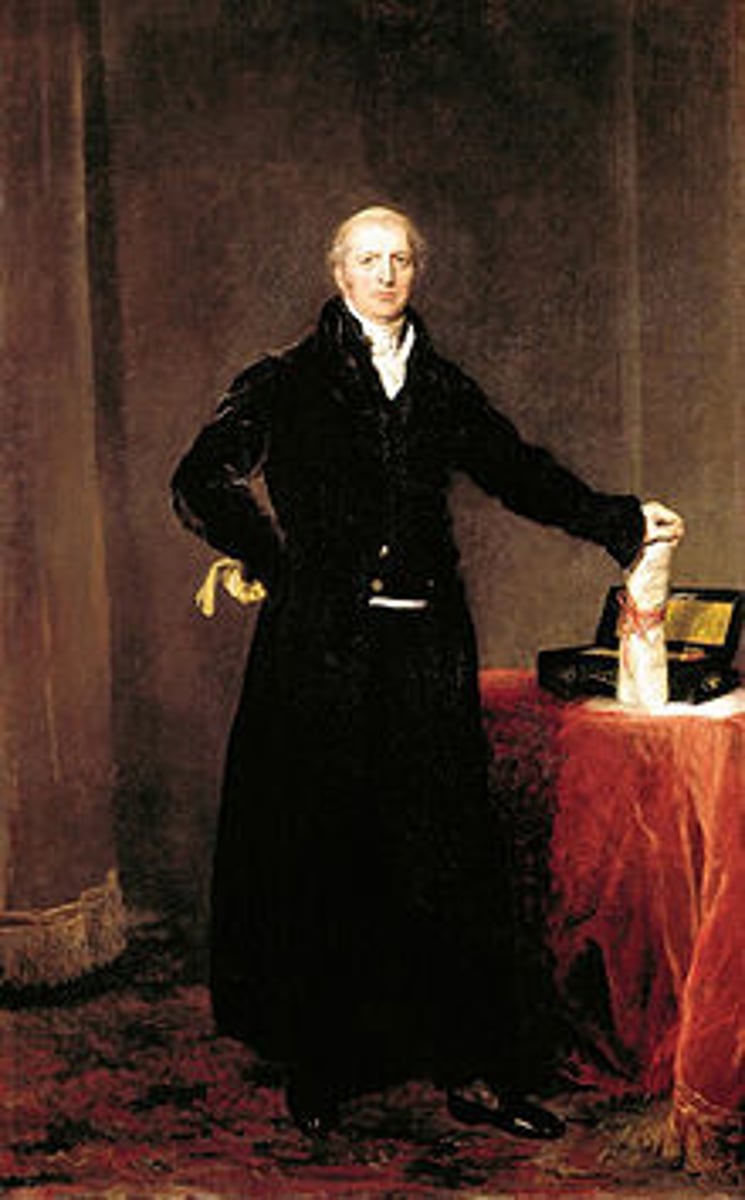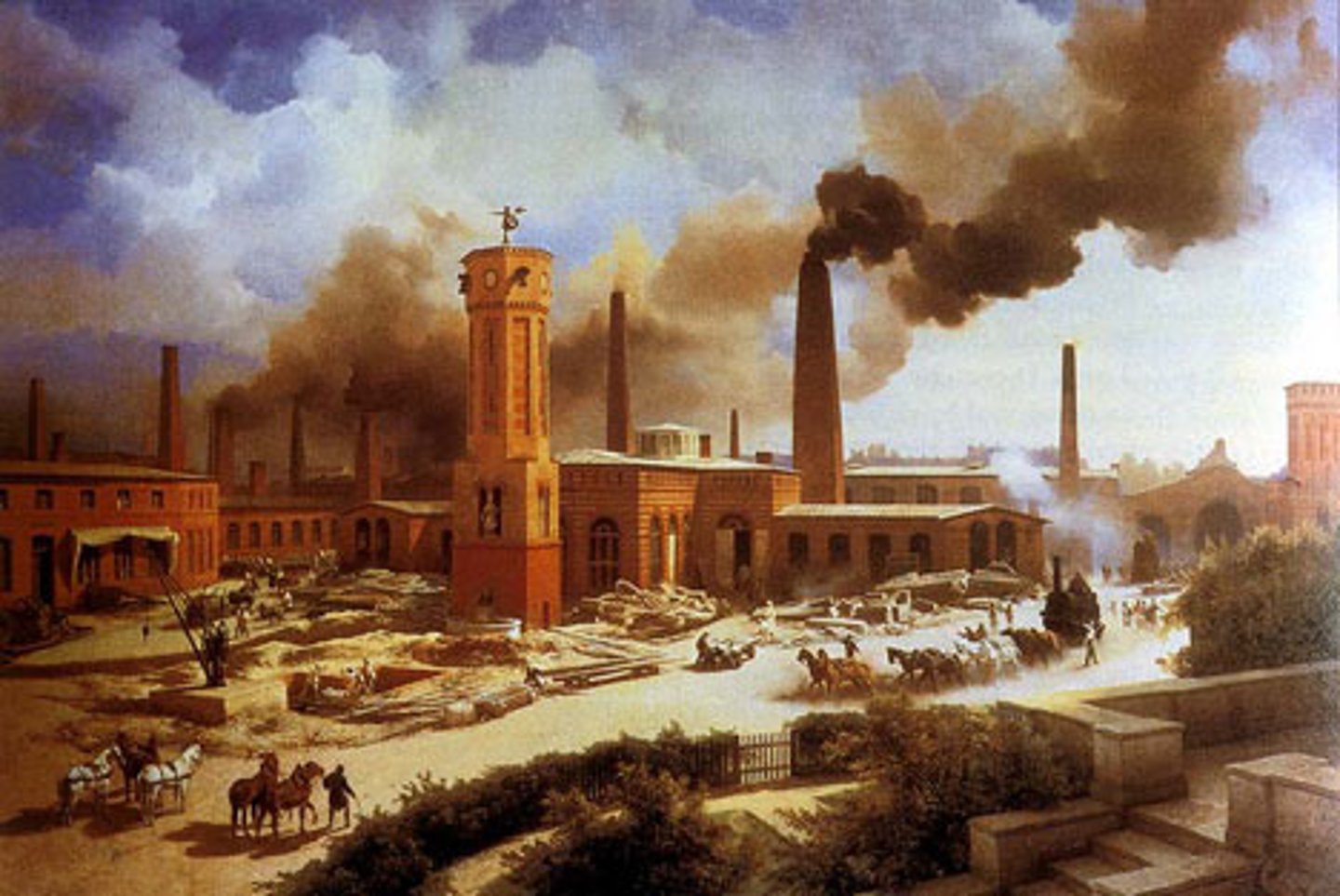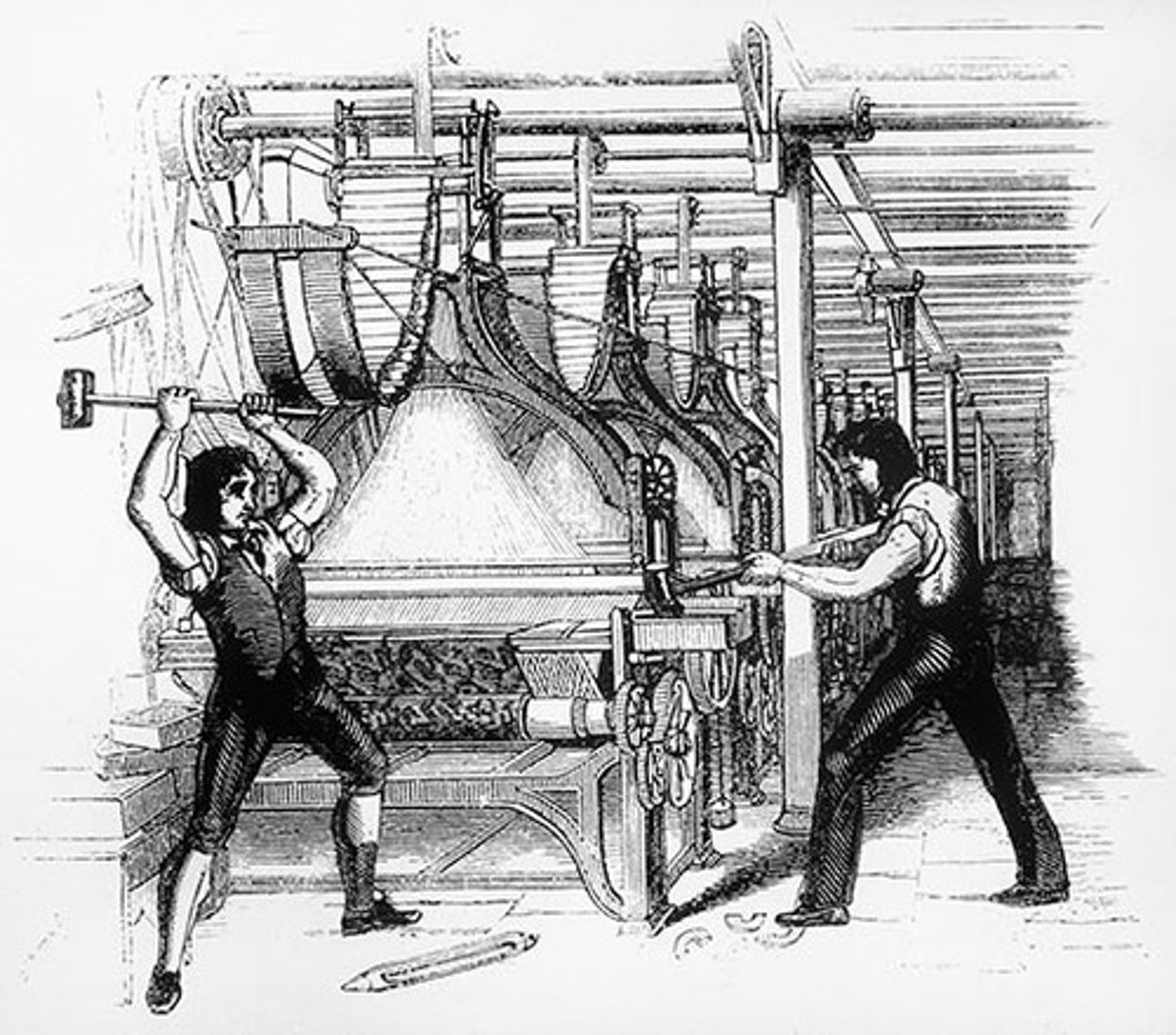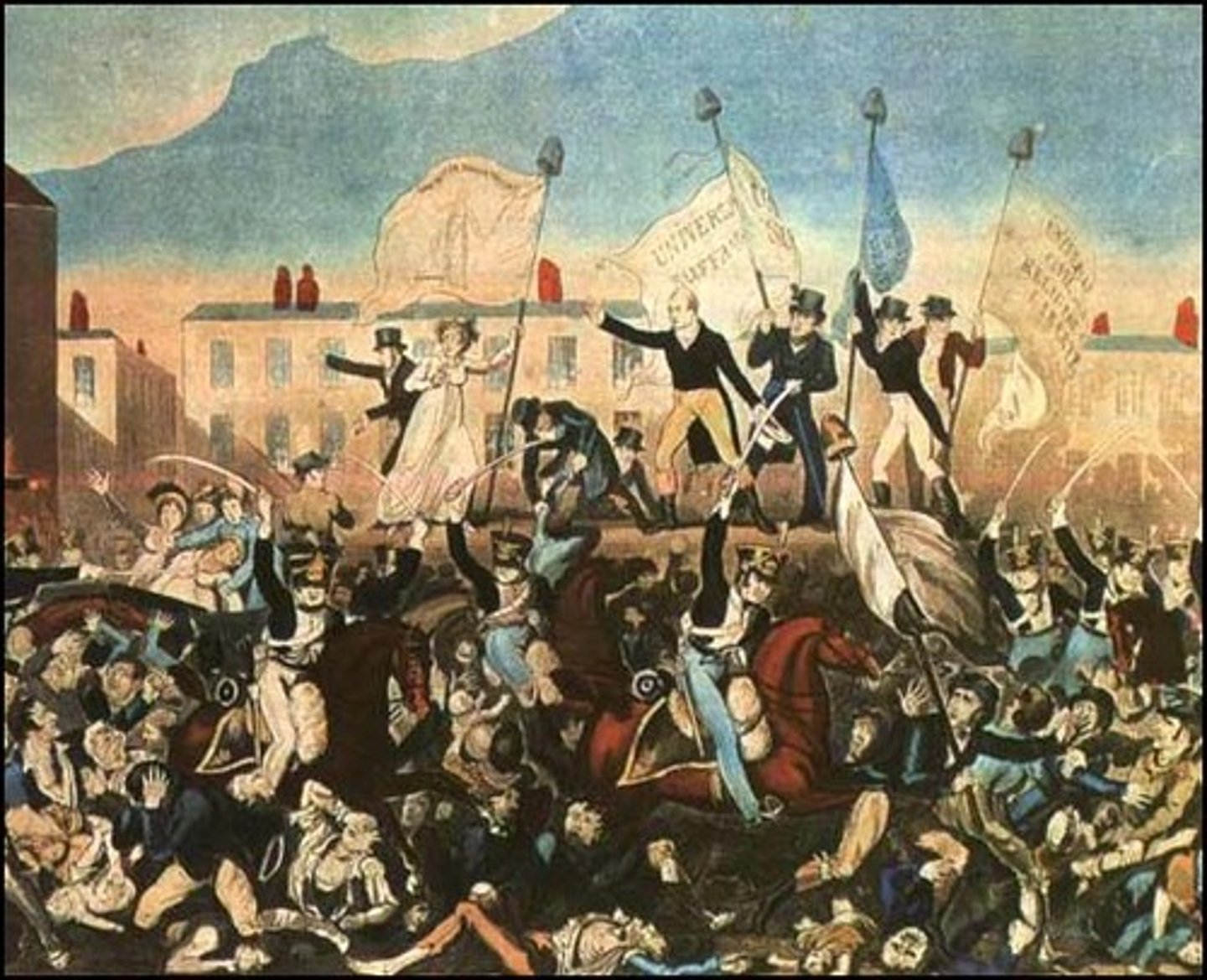Pitt to Peel OCR A-level (Topic 2 - Lord Liverpool)
1/34
There's no tags or description
Looks like no tags are added yet.
Name | Mastery | Learn | Test | Matching | Spaced |
|---|
No study sessions yet.
35 Terms
What was Lord Liverpool known for?
- Dealing with radical threat with repression
- Successfully holding together a Tory party of reactionary hardliners and liberal reformers

How did Lord Liverpool become PM?
- Perceval shot dead in HoC, Liverpool made PM by Prince Reagent (June)
- Sat in HoL, Lord Castlereagh spokesman in HoC
Early grievances: New machinery
- Traditional jobs becoming extinct
- Mass unemployment, owners relied on machinery
- Factory wages from 21 shillings to 6 shillings a week

Early grievances: Combination Laws
- Trade Unions banned by Pitt (temporary)
- Workers couldn't organise themselves to pressure for better wages and conditions
- Liverpool refused to repeal the law
Early grievances: Corn Laws
- Foreign corn imported at low prices, home grown couldn't compete
- Banned all foreign corn imports (1815), made prices high, no competition, bread expensive, famine
- Govt accused to 'class legislation'

Early grievances: Taxation
- Abolished income tax for earning £60+ a year
- Govt debt repayments £31 Mn a year
- Chose to tax tea, sugar, tobacco, beer, paper, soap, candles. Poor were outraged
Early grievances: Game Laws
- Increased desperation for food
- Increased cases of poaching (on private land etc)
- Sentence upped to 7 years in Australia
Early grievances: Recession after war with France
- 22 years of making weapons; war ended, and demand dropped
- Businesses collapsed and there was mass unemployment
- 40 000 men demobilized after war
- Living standards fell and famine increased
Early grievances: Urban living and working conditions
- 16-hour workdays; 14-hour workdays for 5+ years
- Some only paid in vouchers; maintained the poverty cycle
- Strict discipline and easy to be dismissed
- Housing cramped, dirty; 20 000 lived in cellars
What was the Truck Act, 1820?
Made it illegal for factory owners to pay their workers in vouchers, had to be paid in valid coin
What was the Factory Act, 1819?
Limited the ages and working hours of children in Cotton Mills
The Luddites, 1811-15
- Causes: Skilled workers being replaced by laboursaving machinery
- Events: Nottingham - smashed machines, burned owners' homes, and attacked owners and their families in protest
- Results: Frame-breaking became punishable by death - 1813, 17 luddites hanged; Militias stationed to stop future riots as such

Hampden Clubs, 1812
- Causes: A list of demands (Major John Cartwright), universal suffrage, secret ballot, and annual elections
- Events: Formed across the Northwest; Cartwright toured the country, appealing to the 'middle' and upper classes; held meetings and published newspapers
- Results: Govt used spies and informers to watch over the Hampden Clubs; Patriotic Unity Society formed to fight against the govt informers, holding large-scale meetings, such as Peterloo
Spa Field meetings (Nov) and Riots (Dec), 1816
- Causes: Demanded communally owned land, lower tax and Parliamentary reform - Henry Hunt
- Events: Meeting led to a riot; two Spenceans roused a crowd to break into and loot a gunsmith; French tricolour flag was raised; Hunt spoke to the rest of the crowd who waited peacefully
- Results: Militia dispersed the crowd, 1 killed, leaders arrested for treason (all released), Habeas Corpus suspended, Seditious Meetings Act 1817
March of the Blanketeers, 1817
- Causes: Handweavers petitions: Parliamentary reform, abolition of Corn Laws, action on unemployment, action on taxes, reinstatement of Habeas Corpus
- Events: 300 men aimed to walk from Manchester to London with their petition, petition wrapped in brown paper and tied around their arms with a bow of white tape
- Results: Militia stopped the men outside of Manchester; 1 killed and some were wounded, 100s arrested and held in prison for weeks
The Derbyshire Pentrich Rising, 1817
- Causes: Govt spy convinced people in Derbyshire that there would be a national uprising, where a new Govt would be set up to aid the poor
- Events: 200 poorly armed men, led by ex-Luddite Jeremiah Brandreth, marched to Nottingham to meet other rebels
- Results: Troops met the men; 45 of them were tried for high treason; 3 hanged, drawn and quartered; 30 transported
The Peterloo Massacre, 1819
- Causes: 60 000 people met at St Peters field to hear Henry Hunt
- Events: Radicals and onlookers turned up in their Sunday best as well as conducting the meeting with exemplar behaviour. Crowd included men, women and children. Magistrates concerned by the gathering of 60 000 people; Untrained Yeomanry were sent to arrest Hunt and disperse the crowd, but on cavalry, they crashed with the crowd who were in a panic; 11-15 people were killed, ~600 wounded; speakers were arrested (inc. Hunt)

Govt response to Peterloo Massacre, 1819
Liverpool's Govt passed the 'Six Acts'
The 'Six Acts', 1819
1) Training Prevention Act - anyone gather to train could be arrested and transported for 7 years
2) Seizure of Arms Act - Magistrates able to search property and persons for weapons
3) Seditious Meetings Act - Banned public meeting over 50 people w/out permission
4) Misdemeanours Act - Reduced delay in bringing those involved with treason to trial
5) Blasphemous and Seditious Libels Act - Stronger punishment for writing against the Church/State
6) Newspapers and Stamp duty - Duties placed on newspapers and journals, hitting low-cost radical publications
Consequences of the 'Six Acts'
- Radicalism increased and became secretive:
→ The Cato Street Conspiracy, 1820
- Causes: Mishandling of Peterloo
- Events: Arthur Thistlewood's gang planned to
blow up the British Cabinet.
Govt spy reported them.
- Results: 5 hanged, 5 transported for life
- Public contempt for Govt:
→ The Queen Caroline Affair, 1821
- Causes: 1795, Prince of Wales married (cousin)
Caroline under his father's orders (pay
off his debt).
Caroline moved to Italy w/ a pension,
Liverpool tried to arrange a divorce
between the two, accusing Caroline of
adultery - the public supported Caroline.
Petitions sent to Downing St
- Events: 1821, Caroline dies, Liverpool tried to bury
her discreetly, no public mourning.
London crowd forced the precession off
the back streets
- Results: 2 men shot; Liverpool convinced things
had to change.
'Tory' in the 19th century
- Protectionism; Govt involved in economy (tariffs on foreign imports)
- Traditional; very cautious of reform
- Against religious freedom
- Maintain political system; protect the power of the Monarch
'Liberal' in the 19th century
- Free trade; with little to no Govt interference, "Laissez Faire"
- Moderate social and legal reforms; wanted freedom of speech, no repercussions with what is said
- Religious tolerance and equality for disinters; freedom of religion and Catholic Emancipation
- Parliamentary reform; wanted fairer MP representation in Westminster
Why did Liverpool reshuffle his cabinet?
The death of Lord Castlereagh gave Liverpool the opportunity to change his cabinet (1822)
- Lord Castlereagh was very unpopular: too traditional, became paranoid from syphilis, convinced he was being blackmailed for his alleged homosexuality, committed suicide.
Who was replaced in Liverpool's Cabinet?
He replaced 'reactionary and repressive Tories' for 'Liberal Tories'
Foreign Secretary: Lord Castlereagh -> George Canning
Home Secretary: Lord Sidmouth (Addington) -> Robert Peel
Chancellor of the Exchequer: Lord Eldon -> Robinson
President of the Board of Trade: ... -> William Huskisson
How liberal were Robinson and Huskisson's economic policies?
- Import Duties: Partially Liberal
- Colonial Trade: Liberal
- Reciprocity of Duties Act 1823: Partially Liberal
- Corn Laws modified 1828: Partially liberal
- Bank Act 1826: NOT Liberal
Briefly explain each policy of Robinson and Huskisson
Import Duties - raw materials had reduced taxes
Colonial Trade - Br Colonies permitted to trade w/ foreign powers
Reciprocity of Duties Act 1823 - Allowed only 15 countries had reduced tariffs on imported goods to UK
Corn Laws modified 1828 - Foreign bread allowed if Br bread rises to 73s a quarter
Bank Act 1826 - Banned banks from producing their own private notes (stabilise trust in economy)
How liberal were the law and order policies of Robert Peel?
- Penal Code reformed: Partially Liberal
- Spying: Liberal
- Jail Acts, 1823: Partially Liberal
- Metropolitan Police Acts: NOT Liberal
- Combination Laws repealed, 1824: Liberal
- Amending Acts, 1825: NOT Liberal
Briefly explain the law and order policies of Robert Peel
Penal Code reformed - 180 crimes lost the death penalty, to try get more people punished, public hangings still remained
Spying - Evidence collected by spies couldn't be used in court
Jail Acts, 1823 - Prisons inspected regularly to reduce abuse, only done in large cities, rural prisons till had abuse and overcrowding
Metropolitan Police Acts - Introduced 1000 police constables in London
Combination Laws repealed, 1824 - Allowed workers to form Trade Unions
Amending Acts, 1825 - Banned Trade Unions from organising strikes
How liberal were the Religious policies of Peel?
- Suicides: Liberal
- Repeal and Test of Corporations Acts, 1828: Partially Liberal
- Catholic Emancipation, 1829: Partially Liberal
Briefly explain the Religious policies of Peel
Suicides - Corpses no longer buried at crossroad with a stake in the heart
Repeal and Test of Corporations Acts, 1828 - Dissenters permitted to stand in all important offices of state jobs, but didn't include Catholics
Catholic Emancipation, 1829 - Permitted to stand in most important offices of state jobs, but only passed under threat, also couldn't be chancellor, Monarch, Lord Lieutenant of Ireland, split the Tories
Why were Catholics unhappy before Emancipation?
They were second class citizens, and were promised Catholic Emancipation by Pitt when he abolished the Irish Govt (which the King blocked)
Who was Daniel O'Connell and what did he do?
A Catholic barrister, he wanted Emancipations, setting up the Catholic Association, which was well funded by 'Catholic Rent' of 1p a month. Pressured Irish MP's in Westminster for Emancipation
Why did Wellington and Peel agree to Catholic Emancipation?
1828 County Clare, O'Connell became MP, couldn't stop him so being an MP, but wasn't allowed to enter parliament unless he declared Transubstantiation was false. Wellington couldn't let O'Connell in, but didn't want a Civil War with Ireland
Explain the consequences of Catholic Emancipation to the Tory party
Split the Tory party: Moderates, Hard-line Ultras (furious it was passed), and Liberal Canningites (furious over increase in property qualification). The Whigs became more popular.
Why did Wellington resign in 1830?
Wellington found it hard to get a clear majority in parliament. Failed to pass a Bill on the Civil List (limit monarchs funding), took it as a vote of no confidence and resigned.
New King, William IV asked Early Grey to form a new minority Govt.